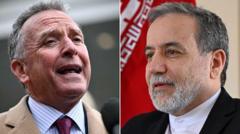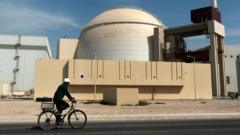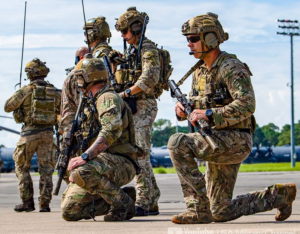Energy Secretary Chris Wright indicates potential breakthroughs in negotiations for U.S. nuclear technology to Saudi Arabia.
**U.S. and Saudi Arabia Advance Nuclear Cooperation Talks**

**U.S. and Saudi Arabia Advance Nuclear Cooperation Talks**
Explorations for a deal that could transform Saudi energy policies and relations with Israel gain momentum.
In a significant development, U.S. Energy Secretary Chris Wright announced on Sunday that talks with Saudi Arabia regarding access to U.S. nuclear technology have made progress, indicating a possible collaboration on developing a commercial nuclear power industry. Following recent meetings in Riyadh, Secretary Wright conveyed optimism about the negotiations, stating that “there is a pathway” for the U.S. to support Saudi Arabia in establishing a nuclear energy framework, which could include uranium enrichment capabilities.
Wright emphasized that while specific agreement details are still pending, he anticipates “meaningful developments” in the near future. He hinted at the complexity of the discussions, noting the importance of controlling sensitive technologies related to nuclear energy. “Yes, there are solutions to enrich uranium here in Saudi Arabia,” he specified, addressing key concerns surrounding nuclear proliferation.
The U.S. had previously stalled discussions on this nuclear partnership, largely due to Saudi Arabia's reluctance to comply with conditions designed to ensure that its nuclear program would not facilitate the development of nuclear weapons. One major point of contention has been whether Saudi Arabia should enrich uranium domestically, as this could potentially unlock pathways to weapon-grade uranium.
Wright was cautious when discussing the ties between the nuclear talks and the normalization of diplomatic relations with Israel, stating that “relationships are always package deals.” He highlighted the broader spectrum of cooperation opportunities that might exist between Saudi Arabia and the U.S.
Historically, Saudi Arabia has actively sought U.S. assistance in developing a nuclear energy initiative, as officials aim to diversify the country's energy portfolio beyond oil. The renewed dialogue is seen as a critical step towards enhancing energy security while simultaneously shaping geopolitical dynamics in the region, particularly concerning relations with Israel.
Wright emphasized that while specific agreement details are still pending, he anticipates “meaningful developments” in the near future. He hinted at the complexity of the discussions, noting the importance of controlling sensitive technologies related to nuclear energy. “Yes, there are solutions to enrich uranium here in Saudi Arabia,” he specified, addressing key concerns surrounding nuclear proliferation.
The U.S. had previously stalled discussions on this nuclear partnership, largely due to Saudi Arabia's reluctance to comply with conditions designed to ensure that its nuclear program would not facilitate the development of nuclear weapons. One major point of contention has been whether Saudi Arabia should enrich uranium domestically, as this could potentially unlock pathways to weapon-grade uranium.
Wright was cautious when discussing the ties between the nuclear talks and the normalization of diplomatic relations with Israel, stating that “relationships are always package deals.” He highlighted the broader spectrum of cooperation opportunities that might exist between Saudi Arabia and the U.S.
Historically, Saudi Arabia has actively sought U.S. assistance in developing a nuclear energy initiative, as officials aim to diversify the country's energy portfolio beyond oil. The renewed dialogue is seen as a critical step towards enhancing energy security while simultaneously shaping geopolitical dynamics in the region, particularly concerning relations with Israel.






















